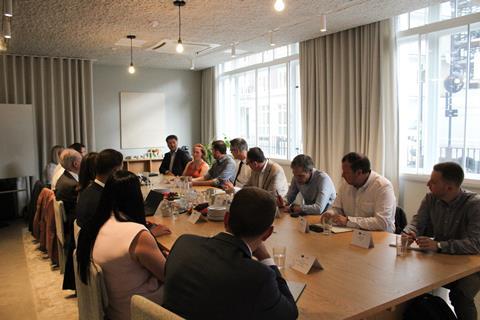Senior industry professionals gathered to share their diverse perspectives on the rapidly changing world of data centres and the dynamic growth of this construction sub-sector, at a roundtable hosted by Jubb and đă┐Ň┤ź├Ż magazine

ÔÇťThe recent rise in technologies such as AI and IoT ÔÇô internet of things ÔÇô is only set to continue,ÔÇŁ said Mark Barrell, associate director of Jubb. ÔÇťThis means the rapid development of data centres needs to continue, which is increasing demand on the construction sector.ÔÇŁ
Barrell was speaking at a roundtable hosted by Jubb and đă┐Ň┤ź├Ż magazine which brought together a group of industry leaders to discuss the pressing challenges and opportunities in data centre construction.
From power constraints to sustainability and supply chain management, the roundtable, chaired by Jordan Marshall, special projects editor at đă┐Ň┤ź├Ż, featured data centre experts to explore what the future might hold for those working in a rapidly expanding sector.
Addressing challenges in data centre construction
Securing appropriate sites for data centre projects is fraught with significant risks, said Stuart Gray, senior director of development in Europe at CyrusOne, but it is not the most significant challenge. ÔÇťThe biggest problem now is power,ÔÇŁ he said. Ben Lane, preconstruction director for Europe at Global Switch, agreed, saying there is a real scarcity of power necessary to meet future demands.
Both Lane and Gray pointed out that if a site cannot be energised (connected to the grid) for five years, this provides more time at the front end of project timescales. Gray in particular said this enhanced pre-construction period should be used to de-risk the construction site stage.

This importance of early contractor involvement was underscored by Jake Shorrock, project leader at Laing OÔÇÖRourke, who said: ÔÇťForge those partnerships early, and it will de-risk the programme significantly.ÔÇŁ He added that ÔÇťscalable and repeatable design capabilitiesÔÇŁ are key to success in data centre delivery.
On this point, Nancy Lamb, construction solicitor at Arch Conexus, noted a trend toward more pre-construction services agreements (PCSAs) to mitigate design and delivery risks, stressing the need for legal oversight throughout the process. However, the group as a whole did concede that this would add to costs in the design phase.
For his part, Muhammad Khan, London director and data centre specialist at Hyphen, agreed, and said the enhanced pre-construction period is key to tackling this.
He added that designing these facilities involves navigating local regulations and site-specific challenges such as height restrictions and nearby sensitive areas.
Navigating pressures and demands
Louisa Curcio, partner at RLB, advocated for better visibility of the project pipeline, explaining, ÔÇťYouÔÇÖre better able to talk to your supply chain and secure pricing if they have full sight of what is coming.ÔÇŁ She said the pressure contractors face is evident and highlighted the necessity for collaboration and early contractor involvement in a rapidly evolving space for the industry.
Dan Ayley, global head of industrial, science and technology at Turner & Townsend, agreed, saying: ÔÇťThere is no way you can transfer all risk, so the key part is we need to collaborate and partner in what is a very, very fast industry.ÔÇŁ
On this point, Gray cautioned of the impact that increasing speed and aggression in the market would have on projects, linking it to the need for better resource management.
Tony LaCroix, managing director for data centres at McLaren, emphasised reliance on specialised suppliers for owner-furnished contractor installed equipment, suggesting that early engagement is crucial to mitigate pinch points.
Around the table:
- Chair: Jordan Marshall, special projects editor, đă┐Ň┤ź├Ż
- Pete Alexander, EMEA director for data centres, Soben
- Dan Ayley, global head of industrial, science and technology, Turner & Townsend
- Mark Barrell, associate director, Jubb
- Louisa Curcio, partner, RLB
- Stuart Gray, senior director of development in Europe, CyrusOne
- Alister Grey, managing director for technology and manufacturing, Mace
- Pascal Jesset, data centre lead, Avison Young
- Muhammad Khan, London director and data centre specialist, Hyphen
- Tony LaCroix, managing director for data centres, McLaren
- Nancy Lamb, construction solicitor, Arch Conexus
- Ben Lane, preconstruction director for Europe, Global Switch
- Jake Shorrock, project leader, Laing OÔÇÖRourke
- Marcus Weyler, director, Red Engineering
Khan noted the expansion of the client base beyond traditional data centre clients to include industrial and logistics sites, which requires adaptable designs to maximise usable space while adhering to regulatory constraints.
Pascal Jesset, data centre lead at Avison Young, reiterated the role of funding and the government support needed to play with this expanding client base in mind. All the experts around the table said that experienced players in the sector can do much to help guide new entrants, through open sharing of information and the dissemination of lessons learnt across the industry.
However, Ayley said there have traditionally been challenges implementing best practice and lessons learnt from high-achieving projects. ÔÇťMany of us have been involved with projects of a global standards, but no two projects are the same. And the question becomes: why canÔÇÖt we get it the same again?ÔÇŁ he said. ÔÇťThe opportunity is to get the culture and approach aligned across multiple projects.ÔÇŁ
Barrell pointed out that long-term partnerships allow for sharing information, making use of lessons learnt before project teams move on, adding that trust plays a big part in underpinning long-term partnerships
Supply chain issues and management
Supply chain management emerged as a critical area of focus, with Curcio emphasising the need for better visibility and planning within the supply chain to secure pricing and manage resources effectively. ÔÇťWe need to de-risk the supply chain moving forward,ÔÇŁ she asserted. ÔÇťThere is a lot of reliance on a limited number of suppl
















